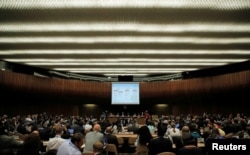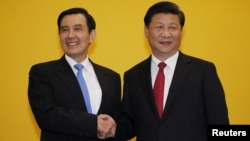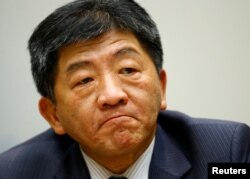Taiwan’s anticipated rejection from observing a third consecutive World Health Assembly will slow its access to world health information including disease outbreaks. But the government used to those rejections has found a series of backdoors to get the health alerts and other updates that it needs.
The 193-country World Health Organization’s (WHO) annual assembly May 20-28 in Geneva is likely to exclude Taiwan, political observers on the island say. China, backed by more than 170 diplomatic allies, normally bars Taiwan from international bodies such as this one because it sees the self-ruled island as Chinese territory rather than a state with diplomatic rights to join.
Taiwan, known for inexpensive universal health care coverage, gets the information it needs from diplomatic allies in the WHO and from members of private medical associations that are allowed to observe the assemblies. Though late sometimes, that intelligence keeps Taiwan up to speed on major issues, such as infectious disease outbreaks.
“Taiwan has been pressured by China for an extremely long time,” said Brian Chang, deputy secretary general with the 50,000-member Taiwan Medical Association.
“We have some friends in nongovernmental organizations, and in their capacity as members in those groups, they can get into the assembly as observers,” he said. “Basically, even though we are missing from the meeting floor, in reality we can continuously get the information we need about ongoing matters.”
Back channels
Members of a private, nongovernmental women’s doctor association, a family practice association and the World Medical Association, a French-based federation of groups for doctors, can get into the assemblies and relay information back to Taiwan, Chang said.
Some of the 16 countries that both recognize Taiwan diplomatically and belong to the WHO also pass along information from health assemblies. China has more than 170 allies, giving it the clout to block Taiwan.
During the WHO’s May 20-28 assembly, member countries are scheduled to examine WHO efforts at containing health emergencies as well as what the organization describes as medical and financial challenges to eradicating polio. The WHO has declared Taiwan polio-free since 2000, but the threat of the poliovirus remains, the Taipei Times news website said in 2013.
Taiwan’s government-run, universal National Health Insurance system should not suffer much in the short term from lack of World Health Assembly access, Scott Lai, director-general of the foreign ministry’s Department of NGO International Affairs, told a news conference Thursday.
Taiwan joined the assembly as an observer every year from 2009 to 2016, when former president Ma Ying-jeou’s government was getting along with China. Current President Tsai Ing-wen, who took office in 2016, rejects Beijing’s dialogue condition that both sides belong to one China, fanning distrust in the Communist leadership. Taiwan did not get invitations to the assembly in 2017 and 2018.
Taiwan is set back only by delays in getting WHO information, Chang said.
“We eventually get the information, but we will be a little bit late, a few days or even a few weeks later,” said Shane Lee, political scientist at Chang Jung Christian University in Taiwan.
“About these epidemics in other countries, if we were a full member of the assembly or the organization, we will get it immediately, by e-mail or whatever,” Lee said. “But if you don’t, you get it from the third countries or some kind of channels. When you deal with an epidemic, the earlier the better.”
No exchanges among officials
Over time Taiwan’s health care practices would benefit from dialogue with the world’s top health officials at the assembly, Lai told the news conference.
“If there’s no way we can study or hear what other people are saying, we won’t know why and how other people are debating things, all we know is the answer,” said Huang Kwei-bo, vice dean of the international affairs college at National Chengchi University.
Other countries would learn as well from Taiwan’s nearly 100 percent health care coverage under its National Health Insurance system, Lai said.
“The rate of our citizens’ satisfaction over the past years with the health care system has surpassed 85 percent, that’s not easy and it’s an example I think we could share,” he said.
Taiwan spends more than $44 million on technical and medical assistance overseas every year, according to foreign ministry figures.
Taiwan health and welfare Minister Chen Shih-chung said Wednesday he would lead a delegation to Geneva from May 17, even if not invited to the assembly. He told reporters Taiwan had “not only contributed substantially to the global network of medical care and disease prevention” but also is “willing to help developing countries in need,” as quoted by government-funded Central News Agency.







